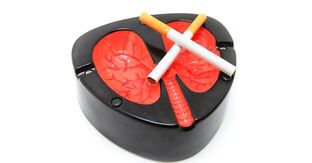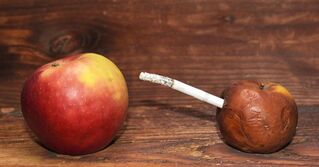Everyone knows the harmful effects of cigarettes, but not everyone knows the mechanism of recovery and life recovery without bad habits. In the process of fighting against nicotine addiction, the understanding of all processes in the body can be an additional motivation. Let us consider how it happened, what it means to quit smoking, and how to make it as comfortable as possible to get rid of addiction.
What happens to your body after you quit smoking?
Stop smoking before the irreversible pathological process occurs, although it can take a long time for a person to recover his health. Even with short-term but regular use of tobacco products, it takes 5 to 10 years for the body to fully recover. However, the first signs of performance improvement can be seen in a few days.

For this, it is worth trying to record on paper all the feelings that occur during the quitting process. By keeping a smoking cessation diary every day, you can determine all the changes that occur every day. This is also a way to create good motivation for yourself and celebrate every success achieved in this hard work.
Next, we will tell you in more detail how to restore all organs and systems.
How does the state of internal organs change?
Quit smoking completely has a beneficial effect on the human body, but not all changes can be seen with the naked eye. Let's take a look at some of them:
- Blood pressure is lowered, and the risk of myocardial infarction is reduced several times.
- The walls of blood vessels are strengthened and the organs are rich in oxygen.
- The bronchial tubes have healed, the lungs are cleared of thick sputum-breathing becomes easier, shortness of breath and annoying cough pass.
- reduces the chance of developing cancer, including lung cancer, the most common such disease.
- Restored smell and taste buds.
- After prolonged exposure to toxic substances, it can clean the liver.
- The risk of sudden death has been reduced by 10 times.
This is only the main part of what happens after smoking cessation, because almost all organs of smokers can recover from the effects of toxins and carcinogens contained in tobacco smoke.
The external changes of the body after quitting smoking
Women are most interested in how you look when you quit smoking. We are eager to answer that life without cigarettes will only bring positive changes to your appearance. Visual improvement can be seen within 4-6 weeks. First, since toxins no longer enter the human body and the blood is full of oxygen, the skin tone becomes healthier and the light gray tone disappears. The teeth are visibly white and are not affected by the tar contained in tobacco products. Every smoker will have a yellowish tint that disappears from the fingers.
The teeth are visibly white and are not affected by the tar contained in tobacco products. Every smoker will have a yellowish tint that disappears from the fingers.
After 6 months, women noticed that the hair follicles became stronger, and as a result, hair loss was reduced and appearance improved. Because it does not produce tar and toxins, the natural production of collagen improves human skin, and collagen is no longer blocked by smoking.
Quitting smoking: What happens to the bodies of men and women
Smoking at least affects the human reproductive function of the cardiovascular system or lungs. However, timely termination of the intake of toxic substances contained in cigarettes will maintain the health of men and women. Therefore, in addition to general improvement, women can observe the following physical changes after quitting smoking:
Hormone levels are normalized, because the toxins contained in tobacco smoke will no longer be provided, which can adversely affect the hormones in women.For men, developing bad habits can improve their sexual function. This applies not only to increasing potency and extending the duration of sexual intercourse, but also to the ability to reproduce healthy offspring.
The most common negative consequences of quitting smoking
The first thing most people trying to overcome their nicotine addiction should pay attention to is not positive changes, but negative changes. This is not surprising, because withdrawal syndrome-a kind of withdrawal symptom, begins when you stop taking nicotine. In order to know what to do, consider what happens after you quit smoking:
By providing physical support, all these symptoms can be minimized.
How to maintain immunity in the body?
The immune system responds immediately to changes related to stopping nicotine intake, and in the initial stages, this response is usually the opposite of the expected response. Many times, someone argues that I have not smoked for a month and that I get sick more frequently than during smoking. Former smokers are more susceptible to various viruses, and are susceptible to any of them, which is related to changes in body structure. Therefore, measures should be taken to strengthen the immune system. Therefore, in the process of quitting smoking, doctors recommend taking a multivitamin complex to keep all the necessary vitamins and trace elements in balance.

In addition, in this case, traditional medicine recipes will not be redundant. Echinacea tincture, ginseng, green tea with honey and lemon will be useful helpers.
Please note that it is not recommended to resort to medicine when separating bad habits.
How to help the lungs?
Especially tobacco smoke affects the lungs and bronchi, so you should help them to clear thick phlegm as soon as possible. For this, you should consume a lot of liquid. Fresh water is also an ideal choice. In addition, we must pay attention to the humidity of the house. Dry air is known to suppress coughing, thereby slowing down the cleaning process.
Herbs and syrups based on them are good substitutes for synthetic mucolytics. An effective budget option is licorice root syrup. You can also use herbal blends of wormwood, horsetail, plantain, icanane and elderberry in tea form. Therefore, during the period of smoking cessation, the changes in the body (ie the organs of the respiratory system) will proceed with minimal discomfort.
How to overcome neurological diseases related to bad habits in the first month?
The most adverse reactions of former smokers to themselves are the nervous system. Therefore, almost everyone exhibits a state of depression, and in some cases even a state of depression. If you consider what happens when you quit smoking every day, then in the initial stage, the nervous system suffers more than other systems.
As mentioned above, it is very undesirable to take drugs when quitting smoking, but this rule does not apply to sedatives, which can effectively deal with mental stress. However, only use the medication as directed by your doctor.

Herbal lovers should make soothing herbs (such as motherwort, peppermint, valerian) into tea or tablets.
What measures can you take to prevent quitting smoking and gaining weight?
Particular attention should be paid to diet so that changes after quitting smoking will not affect weight. Weight gain is the result of increased appetite, and if you don’t take this problem seriously, you can gain weight significantly. This fact usually scares women who smoke and forces them to give up the idea of quitting bad habits.
During the withdrawal period, a lot of vegetables and fruits should be included in the diet. Fiber is excellent at suppressing hunger and can keep you full for a long time. You should also avoid spicy and high-fat foods, and pay attention to desserts and pastries. Lollipops and seeds can also be said to be the same, they have become a substitute for many cigarettes. They should like apples, carrots or a glass of water.
What happens every day when you quit smoking?
One can feel the initial results of fighting addiction on the first day. Moreover, during this period, the most obvious is precisely the negative reaction, just like the positive reaction, it should be included in the smoker's diary (if any) in order to get a general understanding, strengthen the spirit and understand that passed but not interruptedContent. So, what is the risk of quitting smoking every day:
- 1 day: Loss of appetite and apathy.
- Day 2: Tension, possible insomnia.
- Day 3: The desire to smoke becomes particularly strong.
- Day 4: The cough worsens with the discharge of sputum.
- Day 5: Constant hunger pangs.
- Day 6: Depression may occur.
- Day 7: Withdrawal syndrome gradually subsided.
At the same time, the pulse and blood pressure are stable, the risk of heart attack is reduced, the smell is improved, and the organs are filled with oxygen.
The changes in the body after quitting smoking occur in one month or one year.
For a person who quit smoking, the daily impact on the body is just the beginning of a long road to recovery that lasts for several years. However, this was the most productive year of the first year, because the largest number of changes occurred during this period, and these changes were not only shown in appearance, but also in the general condition of former smokers: At this stage, we can say with certainty that the dependency has disappeared. This is the most common problem among smokers with various experiences. There is a view that based on the duration of one's addiction, it is worth fighting the addiction. However, most doctors believe that eliminating smoking will not bring positive results. Therefore, the habit of smokers has not disappeared, and the body continues to need nicotine. Therefore, the best solution is to completely and decisively reject tobacco products. Despite the fact that the smoker will face the difficulties we described above, in the end he will retain the most valuable thing-health. But in some cases, it cannot suddenly solve the addiction problem. This applies to heavy smokers who consume an average of 1. 5-2 packs of cigarettes per day. In this case, it is worth trying to reduce the amount of smoking methodically until you stop smoking completely within a month. As you can see, there are many obstacles to a healthy, nicotine-free life. The most important thing is to understand that they are all temporary and be prepared for the fact that these temporary difficulties will not allow you to retreat before your main goal (independent of nicotine).What is the best way to work hard or to throw gradually?
























